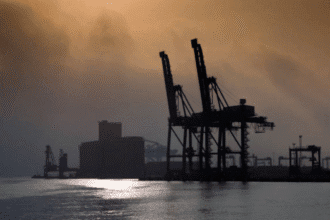Angola is going through unheard of unrest after protests erupted throughout the United States due to soaring gas prices. What started as a 3-day strike by taxi drivers in the capital, Luanda, speedy escalated into one of the biggest and most violent waves of public dissent in recent years. Four human beings had been mentioned killed, and over 500 individuals were arrested as clashes with police intensified throughout the week.
The protests, sparked by a big hike in diesel prices, have disrupted everyday life in Angola’s capital and beyond. Roads have been blocked, businesses looted, and violent encounters among demonstrators and law enforcement have become commonplace. Despite authorities’ claims that gas costs are nevertheless among the lowest in the world, great anger has grown, especially as the value of living keeps on upward push.
Why Did Protests in Angola Erupt?
The demonstrations have been to started with induced with the aid of the authorities to raise diesel costs by means of over 33%. The fee hike, implemented in early July as part of a broader circulate to segment out fuel subsidies, has had a ripple effect on Angola’s economy. Public shipping fares surged, and vital items such as food have become extra high-priced due to increased transportation fees.
For many Angolans, especially those relying on taxis for their daily commute, the hike turned into a tremendous burden. As the protests spread, locals voiced their frustration not simplest approximately gasoline prices but also the broader monetary hardships faced by ordinary residents. Activists and ordinary people alike pointed to developing poverty, hunger, and bad living conditions as the main drivers behind the unrest. Here is the link to our article on Fueling Shutdown Crisis
How Has the Government Responded to the Protests?
President João Lourenço has downplayed the gas rate protests, declaring that they are being used as a pretext to destabilize the government. He pointed out that even after the price boom, Angola’s diesel prices remain decrease than in lots of different countries. However, this has done little to ease the mounting public discontent.
In a bid to control the scenario, the Angolan government condemned the violence and accused protesters of using the gasoline problem as a cover for other agendas. State media have been criticized for his or her loss of coverage on the protests, continuing with regular programming at the same time as unrest opened up inside the streets.
What Are the Wider Implications of Angola’s Fuel Price Protests?
The protests in Angola have sparked conversations approximately the country’s management, governance, and long-standing financial struggles. Angolans are increasingly disappointed with the ruling MPLA party, which has been in power for nearly 50 years. Many protesters have used the demonstrations to express their broader frustration with the political established order, demanding trade.
Taxi associations, which include ANATA, have distanced themselves from the violence, yet they continue to raise awareness about the issues of the Angolan people. Many protestors accept as true that their voices aren’t being heard with the aid of the government, with President Lourenço’s promises to improve wages and living conditions in large part unfulfilled. Here is the link to our article on Fueling Sanction Violations
How Has the Violence Affected Daily Life in Angola?
As violence unfolds, the streets of Luanda have become scenes of destruction. Businesses, banks, and shops have been closed, even as civil servants have been asked to return to work; however, non-public-sector employees in large part stayed domestic due to protection concerns. The authorities have warned that they’ll continue to patrol the streets and take important action to restore order, as many regions remain worrying.
Local authorities have issued statements condemning the “acts of vandalism,” claiming that some organizations took advantage of the unrest to escalate violence. However, protests in different towns, such as Huambo, suggest that the discontent is enormous and is no longer restricted to the capital.
Final Thoughts: The Future of Angola Amidst Fuel Price Protests
The ongoing Angola protests reflect growing frustration over the country’s economic struggles and governance. Despite government assurances, many Angolans feel their needs are not being addressed. With rising food costs and worsening living conditions, the protests highlight widespread discontent. The future of Angola depends on whether the government can tackle the issues behind the unrest and implement meaningful reforms before the situation deteriorates further.








